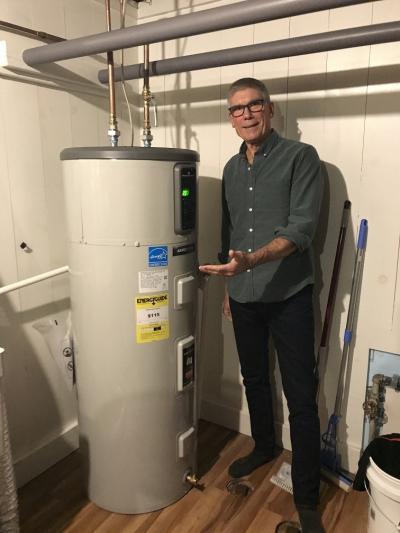Town of Falmouth Sustainability Newsletter
A publication of the Recycling and Energy Advisory Committee
Posted on: January 25, 2021 - 11:10am
WINTER 2021
HOME HEATING EDITION – HEAT PUMPS
A note from the editor
 Welcome to the Town of Falmouth Sustainability Newsletter, 2021 edition. Hello! I’m new here, and perhaps you are as well. I began my role as Falmouth’s Sustainability Coordinator in October 2020. I’m a Maine native (hailing from far Downeast) and have been living in the Portland area on and off for the past 11 years. Prior to joining the Falmouth team, I worked in the Sustainability Office in Portland for two years, where we championed many of the same sustainability initiatives that Falmouth is focusing on today. I value and appreciate Maine small towns and the way of life that we are lucky enough to contribute to and enjoy everyday. My goal is to support Falmouth by supporting its residents and businesses through initiatives that will make us more resilient and sustainable. If you have any questions about Sustainability, or what I’m working on, please don’t hesitate to email me (akrulik@falmouthme.org) or call (207-699-5337) or check out our website www.falmouthme.org/sustainability. I look forward to working with you all! Ashley Krulik, Sustainability Coordinator
Welcome to the Town of Falmouth Sustainability Newsletter, 2021 edition. Hello! I’m new here, and perhaps you are as well. I began my role as Falmouth’s Sustainability Coordinator in October 2020. I’m a Maine native (hailing from far Downeast) and have been living in the Portland area on and off for the past 11 years. Prior to joining the Falmouth team, I worked in the Sustainability Office in Portland for two years, where we championed many of the same sustainability initiatives that Falmouth is focusing on today. I value and appreciate Maine small towns and the way of life that we are lucky enough to contribute to and enjoy everyday. My goal is to support Falmouth by supporting its residents and businesses through initiatives that will make us more resilient and sustainable. If you have any questions about Sustainability, or what I’m working on, please don’t hesitate to email me (akrulik@falmouthme.org) or call (207-699-5337) or check out our website www.falmouthme.org/sustainability. I look forward to working with you all! Ashley Krulik, Sustainability Coordinator In this edition of the Sustainability Newsletter,
we are focusing on home heating. As we embrace another Maine winter, I’m sure that many of you are thinking about your home heating costs, efficiency, and options. In this newsletter, we’ll talk about heat pumps and;- Learn about heat pump technology
- Explore rebates and cost savings available to Falmouth residents
- Get an insider’s perspective on heat pump water heaters, from our very own Councilor Pete Lafond
A Sustainable Perspective on Home Heating Options
When evaluating home heating options through a sustainability lens, the biggest factor to consider is the carbon emission footprint of each heat source. Carbon dioxide is the leading contributor to climate change and is produced when burning fossil fuels. Nearly two-thirds of Maine households use fuel oil (a big carbon emitter) as their primary energy source for home heating, a larger share than any other state. However, this is changing as new options are emerging and new technologies are being tested. The best heating option available to lower your carbon footprint and save money is electric heat pumps. Heat pump technology has greatly advanced in recent years and the need for back-up heat sources during sub-zero temperatures has lessened. There are two types – ground source (or geothermal) and air source. Ground source heat pumps pull energy from the ground while air source heat pumps extract heat from the air. Both are very efficient, but ground source does require more work to install. By using an electric heat source, homeowners have the option of using renewable energy to power them – which means zero carbon emissions. Governor Mills has set a goal of installing at least 100,000 heat pumps in Maine by 2025 and rebates are available (see next section!). Heat pumps also work for cooling in the summer, something that Mainers will need as we continue to see warmer temperatures each year. Heat pumps are the most efficient home heating source and will pay back over time. To see more details on the carbon and cost savings for different home heating options, visit the Efficiency Maine website and play around with their Home Heating Cost Calculator.Heat Pump Rebates
Efficiency Maine, an administrator of programs to improve the efficiency of energy use and reduce greenhouse gases in Maine, currently has the following heat pump rebates available:- Air Source Heat Pumps: Residential rebates of $750-$2,500
- Ground Source Heat Pumps: Residential rebates up to $3,000
- Heat Pump Water Heater: Pay as little as $349 (Learn more about these in Councilor Lafond’s article below!)
GUEST COLUMN
Heat Pump Water Heaters – An Insider’s Guide
Written by Councilor Pete Lafond
 While many of us are familiar with heat pumps and their many benefits, did you know that hot water heaters now employ heat pumps to operate far more efficiently than a traditional hot water heater? Heating water costs a lot, and I want to reduce my carbon footprint, so I did my research and eventually bought one. Here is what I have learned from researching and using a heat pump hot water heater (HPHW).
While many of us are familiar with heat pumps and their many benefits, did you know that hot water heaters now employ heat pumps to operate far more efficiently than a traditional hot water heater? Heating water costs a lot, and I want to reduce my carbon footprint, so I did my research and eventually bought one. Here is what I have learned from researching and using a heat pump hot water heater (HPHW).- A HPWH removes heat from the air and uses it to heat water. This method of heating water is far more efficient than a standard electric water heater. While this is modern technology, the HPHW looks like and is the same size as a traditional water heater.
- The HPHW heats water well and I don’t notice a difference between an HPHW and a traditional water heater day to day. Our HPHW, as with most models, has four settings: “Heat Pump,” “Hybrid” “Electric” and “Vacation.” Our HPHW provides plenty of hot water in heat pump only mode for two of us, but if (and when) our kids come home and demand increases, we can switch to Hybrid or full electric to provide capacity for increased demand, should we need to. The “Vacation” mode keeps the water at 50 degrees while you are away, and really saves a lot of electricity. You can set the HPHW to resume normal operation a day before you get back, so you have hot water upon your return. Otherwise, it can take a couple of hours.
- Our electric bill is less than it was before the installation of the HPHW. There are varying estimates given for the savings, but it’s generally accepted that (especially with the $750 Efficiency Maine rebate) the HPHW will pay for itself in energy savings in 5-10 years.
- The Efficiency Maine website has a detailed description of HPHWs, and charts that compare HPWH to standard electric heaters and gas water heaters. The website also has names of reliable contractors and retailers.
- HPHW have aspects of their operation that you should weigh in making your decision. The HPHW works most efficiently in a basement or other area that is at least partially heated. In addition, the HPHW acts as a dehumidifier in your basement, but generally only in the room in the basement that it is located in, not an entire basement. A HPHW has to drain the water it removes from the air, and so a drain is required. If you have no drain located close to the HPHW, you may have to purchase a pump to pump the water to a drain, and one of these pumps could cost $200 or more.

